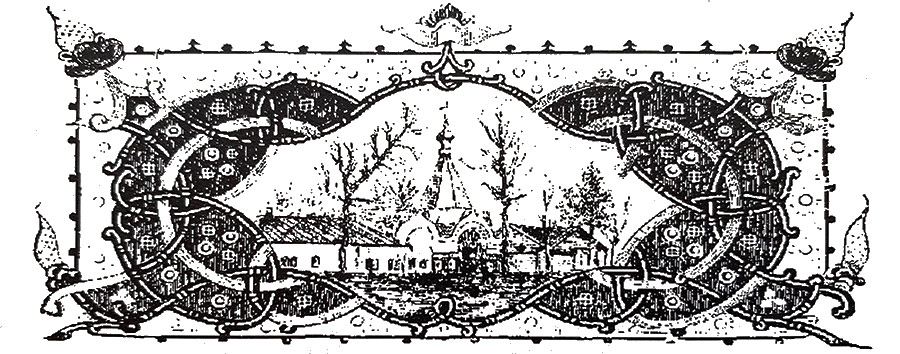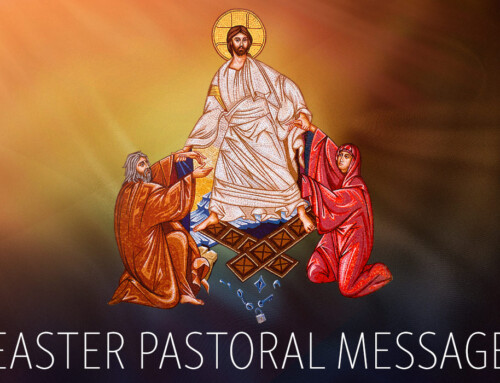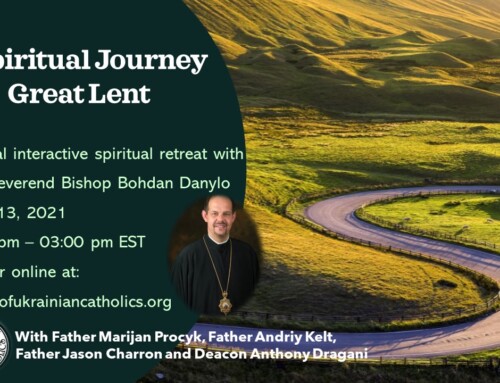Introduction to the Liturgy of Vespers
It was a great blessing to follow the commentaries regarding the Divine Liturgy these last few years. We became more familiar with what our people affectionately call the “Sluzhba Bozha – Divine Worship Service”. This is the common term for the Divine or Eucharistic Liturgy. But what about those services of our UGCC that are not specifically a Divine Liturgy? They are communal prayers and yet they are not the Divine Liturgy.
Surely, we have accepted and wish to heed our Lord’s teaching in Matthew’s Gospel. There He says that there is a right time and place for both communal prayers and for personal prayers. He also says that each of us is called to a lifestyle that includes both of these.
Perhaps we have heard about the holy David saying that “Evening and morning and at noon, I utter my complaint and moan, and he will hear my voice.” – Psalm 54:18 (55:17), RSVCE
This is a reference to what we today call “Evening Prayer, or Vespers”, “Morning Prayer, or Matins with Lauds and First Hour” and “Noon Prayer, also known as the Sixth Hour.”
The full Liturgy of the Hours is comprised of seven services: Vespers, Compline, Midnight, Matins with Lauds and First Hour, Third Hour, Sixth Hour and Ninth Hour. If by “Sluzhba Bozha”, we mean public communal services where the People of God serve the Lord and the Lord serves them, then really the Liturgy of the Hours is no less a “Sluzhba Bozha” then is the Divine Liturgy. Truly, it is as the holy prophet David proclaimed so long ago: “Seven times a day I praise you for your righteous laws.” – Psalm 118 (119):164)
We can even go a step further, for, among the Church Fathers of the East, there was general agreement that prayer (communal, as well as personal) was not simply an aid to salvation, but a means to it. So, my service to God and God’s service to me – “Sluzhba Bozha” in its fullest sense – is not simply just a matter of investing my time and effort into some one good thing among other good things, either of which might be helpful or beneficial, but actually and really it is investing my time and efforts into something that is essential, integral, irrevocable, unavoidable. Without prayer I cannot be saved!
If prayer, communal and not just personal, is indeed a means to salvation then this helps me to understand and receive that the norm of the Church is that all the Faithful should ideally participate not only in the Sunday morning Divine Liturgy, but in all the Divine Services of the Resurrection. On Sundays and Major Feast Days, at the very least, in addition to the Divine Liturgy, one should attend either Vespers or Matins.
The Vatican’s Congregation for the Oriental Churches considered Vespers and Matins to be so life-giving and important that in 1996 they issued an “Іnstruction for Applying the Liturgical Prescriptions of the Code of Canons of the Eastern Churches”, indicating in § 64 that one may attend Vespers or Matins in order to fulfill one’s obligation to gather for a Sunday or Feast-day. They also said in § 98 that “Calling upon the time when the Divine Praises were upheld with special care in the East, not only by the monastic communities, but also by the parishes, the Code of Canons of the Eastern Churches reminds us of the obligation – often easily forgotten or abandoned – to celebrate them in the cathedrals, parishes, rectorial churches, religious communities and seminaries. It is necessary to observe the prescriptions of the liturgical books (canon 309), but a superficial observance is not sufficient: those responsible must do their best for the faithful to understand the meaning and value of this prayer, love it, take part and find spiritual nourishment in it. They ought to thus be formed through a true mystagogical program, which allows them to attain nourishment for their own spiritual life from the celebration of the various moments of the liturgical year”
So, it follows that we need to familiarize ourselves with these services as well. For, how can we find the motivation to attend and then freely offer the sacrifice of participating in praising God – in this particular way instead of another, – if we do not understand why one would choose to do such a thing?
In the First Book of Moses (Genesis 1:5) we read that after God created the light: “And there was evening and there was morning, the first day”.
And so ever since then, the liturgical day of prayer begins with Evening Prayer or Vespers. So also, Great Vespers (Velyka Vechirnia) on Saturday evening is the 1st service of the Lord’s Day. The 2nd Service of Sunday is Matins with Lauds and the First Hour (Utrenia). The Divine Liturgy is actually the 3rd service of Sunday.
We should also not be surprised therefore to read that many commentators on the Liturgy of the Hours would say that the main purpose of celebrating Vespers is that we participate in a sort of mini history lesson which doesn’t allow us to leave out of the picture our own response. Do I want to be a part of this, or not? What is my desire or thought or feeling as a result of meeting or encountering Christ in this particular way of liturgical prayer?
At Vespers, I was created by God, I fell into sin, the Light of Christ (His saving self as well as His acts and His teachings) enters my darkness with a desire to change me forever, and then finally, the Big Question. Do I choose to give myself permission to engage my life with His life, to submit to His rescue mission? Am I willing to allow my lifestyle to include and embrace His new reality of freedom from darkness to the fullest? If so, then it is at Vespers that I am reassured over and over again that I can look forward to the fulfillment of some amazing promises which our Lord has made to those who choose to return His love.
We will continue reflecting upon the meaning of Vespers in the next few installments, but in the meantime if your parish has already restored the Divine Worship Service of Vespers, then the Church encourages you to attend. You can also learn how to pray it at home. It is a beautiful, peaceful service that will help you to be a better Christian and prepare you, so that your experience of the Sunday or Feast-day Divine Liturgy will be more holy and rewarding.
Вступ до Літургії Вечірні
Це було великим благословенням слідувати за коментарями щодо Божественної Літургії останніх декількох років, щоб більше ознайомитися з тим, що наш народ з любов’ю називає «Службою Божою» – простонароднім терміном для Божественної (тобто Євхаристійної) Літургії. Але як тоді називати ті служби нашої УГКЦ, які не є точно Божественною Літургією? Вони проводяться у спільноті, але вони не є Божественною Літургією.
Певно, що ми прийняли і хочемо прислухатися до вчення нашого Господа в Євангелії від Матея, що є правильний час і місце для спільних молитов і особистих молитов, і що кожен з нас покликаний до способу життя, який включає одне й друге.Можливо, ми чули про святого Давида, який говорив, що « Ввечорі і вранці і вполудне розповідатиму, сповіщу і Він вислухає мій голос » (Псалом 54:18 (55:17), Острозька Біблія).Це вказує на те, що ми нині називаємо “Вечірньою молитвою або Літургією Вечірні”, “Ранішньою молитвою, або Літургією Утрені, разом із Хвалітними Псалмами і Першим Часом” і “Полудневою молитвою, під назвою Шостий Час”.Нині Літургія Часів у повноті це Вечірня, Повечеря, Північна, Утреня разом із Хвалітними Псалмами і Першим Часом, Третій Час, Шостий Час та Дев’ятий Час. Коли під назвою Служба Божа ми маємо на увазі службу-молитву яку проводимо прилюдно й спільнотно, де Божий народ служить Господеві, а Господь служить їм, то насправді Літургію Часів можна називати не менше Службою Божою ніж ми так називаємо Божественну Літургію. Воістину це так, як святий пророк Давид наголошував так давно: « Сім разів в день я Тебе хвалив за судьби твоєї праведності. » (Псалом 118 (119): 164, Острозька Біблія).Ми можемо навіть розсліджувати й надалі, бо серед Отців Церкви Сходу існувала загальна думка, що молитва (як спільна, так і особиста) – це не просто допомога для спасіння, а засіб. Отже, моє служіння Богові і Боже служіння мені – Служба Божа в повному сенсі тих слів – це не просто справа мені вкладати мій час і зусилля в одне хороше зайняття, серед всіляких добрих, будь-котре з яких може показатися мені допоміжним або корисним, але насправді і дійсно Служба Божа означає що я вкладаю мій час і зусилля в те, що є істотним-основним, інтегральним-невід’ємним, безповоротним-невідмінним, неминучим. Без молитви я не можу бути спасенним!Якщо молитва, спільна, а не просто особиста, дійсно є засобом для спасіння, то це допомагає мені зрозуміти і прийняти, що норма Церкви полягає в тому, що всі вірні повинні в ідеалі принимати участь не тільки в Божественній Літургії в неділю ранком, але й у всіх Божественних Службах котрі стосуються Воскресіння, тобто неділі. У неділю і основні свята, принаймні, на додаток до Божественної Літургії, необхідно прийняти участь або на Літургії Вечірні або на Літургії Утрені.Ватиканська Конгрегація Східних Церков вважала Вечірню і Утреню настільки життєдайними і важливими, що в 1996 році вона видала “Інструкцію застосування літургійних приписів ККСЦ” де § 64 вказує, що людина може брати участь Вечірні або Утрені щоб виконати обов’язок зібратися на неділю або сято. Далі, § 98 зазначує що, “у Східних Католицьких Церквах, … церковне правило звершується піднесено і урочисто. Тому що його [церковне правило] плекалося на Сході з особливою увагою, не тільки в монастирях, але й парохіях, Кодекс Канонів Східних Церков нагадує нам про обов’язок, який часто забувається чи нехтується ним, а саме: звершувати церковне правило в соборах, парафіяльних храмах, релігійних спільнотах і семінаріях. Необхідно дотримуватись приписів літургійних книг (кан. 309). Проте поверхове дотримання є недостатнім: відповідальні особи повинні робити все можливе, щоб вірні зрозуміли значення і цінність цієї молитви, любили її, брали в ній участь і знаходили в ній духовну поживу. Треба вірних виховувати до цього за допомогою солідної програми містагогії, яка дозволить їм отримувати з переживання різних моментів літургійного року поживу для їхнього духовного життя.”Отже, випливає, що ми повинні також ознайомитися з цими службами. Бо якже ж зможемо знайти мотивацію прибути й таким а не іншим способом свобідно жертвувати Богові нашу участь в прославлянні Бога, якщо ми не розуміємо, для щого хтось би вибирав робити таку річ?У першій книзі Мойсея (Буття 1:5) ми читаємо, що після того, як Бог створив світло: « І був вечір, і був ранок, – день перший ».І ось з тих пір літургійний день молитви починається з вечірньої молитви або Вечірньої Літургії. Так само, Велика Вечірня у суботу ввечері – це 1-ша служба Дня Господнього. 2-га Служба Неділі – Утреня разом із Хвалітними Псалмами і Першим Часом. Божественна Літургія є фактично 3-та Служба неділі.Тому не слід дивуватися тому, щоб читати у багатьох коментаторів Літургії Часів, котрі кажуть, що головною метою святкування Вечірні є те, що ми беремо участь у своєрідному міні-уроці з історії, який не дозволяє нам залишати з картини нашої власної відповіді. Чи хочу я бути частиною цієї історії, чи ні? Яке моє бажання, думка чи почуття внаслідок зустрічі або стрітення з Христом у цьому особливому способі літургійної молитви?На Вечірні, я був створений Богом, я пережив гріхопадіння, Світло Христове (Його спасаюча особa, а не лише Його вчинки і Його вчення) сягає в мою темряву з бажанням змінити мене назавжди, а потім, нарешті, Велике Питання. Чи вирішу я дати собі дозвіл щоб моє життя перепліталося з Його життям, щоб підкоритися його місії мене рятувати? Чи готовий я дозволити своєму способу життя включити Його нову реальність життя у свободі від темряви? Якщо так, то саме підчас Вечірні мене запевняється, раз-по-раз що можу сподіватися на виконання деяких дивовижних обіцянок, які наш Господь зробив тим, хто вирішив повернути Його любов.Ми будемо продовжувати роздумувати над значінням Вечірні в наступних кількох частинах, але в міжчасі, якщо ваша парафія вже відновила службу Вечірні, Церква заохочує вас брати участь. Можна також вивчити як молитися Вечірнею вдома. Це прекрасна, спокійна Служба Божа, яка допоможе вам стати кращим християнином і підготовить вас на більш святe й корисне переживання недільної чи празничної Божественної Літургії.





